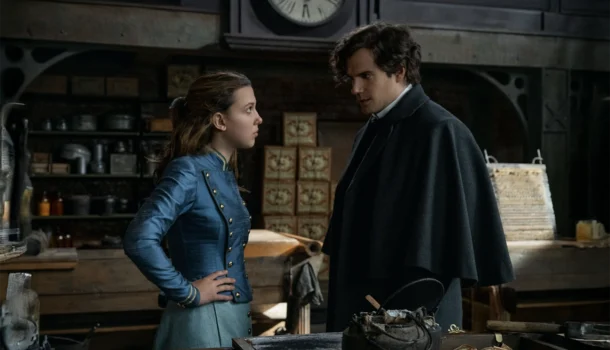The apparent lightness of a young British detective’s world is gradually dissolved by a thick fog of industrial cynicism and institutionalized misogyny. Now entangled in the machinery of a Victorian London poisoned not only by phosphorus but by systems designed to sabotage any female pursuit of autonomy, Enola Holmes faces a world that demands more than cleverness — it demands moral resolve and political acuity. This sequel doesn’t settle for repeating the charm of the first installment; it dares to explore something more intricate — a confrontation with the backstage of modernity, where lives are traded like disposable variables of production.
The young protagonist, played by Millie Bobby Brown, is not merely a shadow of her older brother, Sherlock; she is a disruptive presence in the investigative scene — not due to incompetence, but for defying an order that grants legitimacy according to gender. Pushed to the margins of visibility and stifled by comparison, Enola takes on a case that seems minor but hides deep fractures within a fortress of industrial falsehoods. The search for Sara, requested by her sister Bessie, acts as a lever for a plot that soon unveils something far greater: the systemic cover-up of a labor tragedy disguised as an epidemic.
The narrative gains weight by intertwining Enola’s journey with Sherlock’s own, who, while tracking a refined and cryptic adversary, stumbles upon the same webs that entrap his sister. This parallel structure is not merely aesthetic — it reveals how both characters navigate distinct terrains of legitimacy and suspicion: he moves with implicit recognition; she is forced to earn credibility with every move. In the background, the city’s machinery — factories, newspapers, courts — beats to the rhythm of exploitation, silence, and political convenience.
It’s within this setting that the film’s social critique sharpens. The deaths of factory girls poisoned by phosphorus are not tragic coincidences, but logical outcomes of an economic rationale that prizes production over people. In lifting the veil over this reality, the film suggests that truth isn’t hidden by chance — it’s buried under layers of vested interest and institutional power. As Enola unravels this tangle, she ceases to be a youthful mystery-solver and becomes a conduit for dissent. Her refusal to accept official narratives resounds like a scream smothered by decades of complicit silence.
Her encounter with Tewkesbury, a young MP with reformist ideals, does not serve as a romantic subplot, but as a contrast between faith in institutions and an awareness of their limits. While he still believes in change from within, she already sees that some structures aren’t reformed — they collapse or are corroded from the inside by unexpected agents. Their tense, symbolic dialogue sheds light not only on the political impasse of the era but also on the chasm between parliamentary idealism and the grim reality of industrial alleys.
Unlike the first story, where the critique of female oppression was diluted in subtexts and lightheartedness, this sequel asserts itself as a manifesto populated by women who don’t wait to be given space — they claim it. Underground intellectuals, unseen workers, antagonists shaped by contempt — together they form a kaleidoscope of resistance. What’s striking isn’t just their diversity, but the sophistication with which they face the world: not as resigned victims, but as living strategies against an exclusionary order.
What drives the heart of this story is not the discovery of clues, but the redefinition of the game’s rules. Enola and her allies don’t simply expose a crime; they destabilize a system that profits from suffering. Fiction edges dangerously close to reality by reminding us that behind every glowing factory might lie bodies silenced in the name of progress. And if the world pretends not to see them, it’s because it fears those who will force them into the light.
Film: Enola Holmes 2
Director: Harry Bradbeer
Year: 2022
Genres: Adventure
Rating: 10/10

